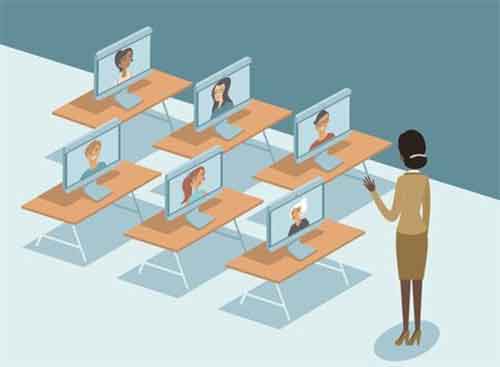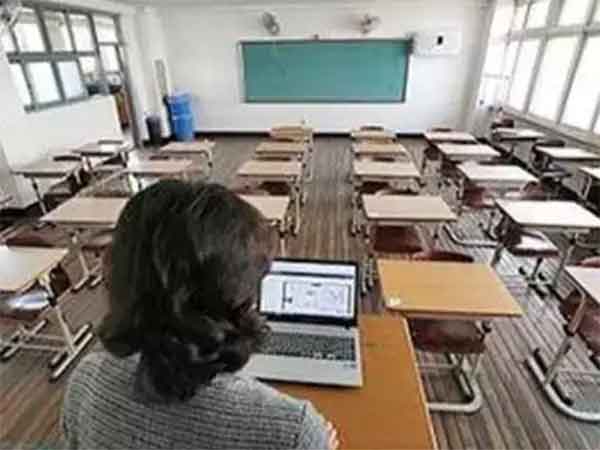
In this time of the COVID pandemic, it is often heard that Coronavirus doesn`t differentiate between rich and poor. Though the virus infects both rich and poor equally, the steps to control it, the reaction of the state, consequences of lockdown — all these don`t paint a picture of equality in a most unequal society. In a country like India, the results of lockdown depend on the class position of the affected person. This becomes clear when we compare the state`s response to the 40 million migrant laborers with the same state`s response to the dollar earning non-resident Indians ( in true sense they are the real migrants) by the ‘ Vande Bharat ‘ project. Nowadays the phrase ‘ New Normal’ has become popular thanks to corporate media. This means the post COVID world will not be the same. Our lifestyle, work procedure, cooking habits, education will see a lot of changes. We will accept these new changes as normal.’ Work from home’ would be seen as an example of a new normal. Jobs will be done from home with the help of modern technology. But the proponents of this new style of work are totally silent about the toiling masses who work from morning to evening in the mines, factories, construction sites or the safai mazdoor, housemaids without whom the so-called civilised society will fall to pieces. In this context, we want to discuss online education now.
This long lockdown period has totally disrupted the education system like other social sectors. Many important examinations have been canceled or delayed, in several classes, students are promoted to the next without an exam. In the current educational year, there is little chance to complete the syllabus within the stipulated time. Midday meal has stopped in govt school so there is every chance that nutrition will suffer among the pupils. Uncertainty has gripped all levels from primary to University. In this critical situation, both central and state govt advocates online education. A number of educationists already declared that online education is the only future. The main idea behind this system is that as the students can not reach in the educational institutions, the teacher will create a virtual classroom applying modern technology and students will attend those classes from home. presently online education is not only a theoretical concept, but it is also already applied and reaction to this process already started. private institutions arranged virtual classes with the help of zoom, Skype and pupils attend the classes with uniform following usual routine In govt and govt aided schools, a few states are organizing classes by using tv channels, teachers are trying to reach the pupils through WhatsApp group also.
At present, the country is going through the phase of unlock-2. Different sectors are gradually opening up. Though the govt previously declared that classes will reopen from 1st July, they backed out due to the vehement protest from a section of guardians. In their protest letter (change.org,1st June 2020) they demanded online education for the rest of the curriculum. These guardians come from those strata of the society which have high purchasing capability and controlled the public opinion on every socio-economic and political matter. Hence facing the wreath of this powerful class, the central hrd minister declared that educational institutions will not reopen before 15th August, though the unbearable plight of millions of poor people couldn’t move the govt.
A few relevant informations——–
Sometimes the unprecedented situation demands unusual decisions.No doubt prolonged lockdown due to COVID has created such a situation in India. In that case, the main responsibility of the govt of a country like India, where severe poverty and inequality runs so high should be to help the neediest section of the society, at least not to make the present gap wider. The same is applied in Education also. So the question arises whether the system of online education should be inclusive for all or a large number of students would be excluded from the arena of education? Would this system deepen the division between rich and poor, urban-rural, among different social strata or would this minimize the loss due to COVID lockdown and prove useful measure for all the students? Whether online education is an emergency and temporary measure or it is going to be a permanent fixture in the name of a new normal? None can deny that the reform prog taken from the nineties has made education a purchase-able commodity.would the system of online education intensify the process of commodification?
Online education is a technology-based system, the minimum requirements for which is an Android phone, continuous high-speed internet data and a computer. Teaching through the
WhatsApp group is practically not possible.
#Among young Indian computer users only 8% used net connection.
# As per a report of Mission Antodaya(2017-18) 47% of Indian people can use electricity for 12hrs/day.
# 26% of Indians used smartphones while the desktop, laptop, or tablet users are only 11%.
# National sample survey reports that 26% of people in our country used internet but 66% of total population resides in rural India where internet users are only 5.15%.
# In 2014 national digital literacy mission or digital ‘saksharata abhijan’ were formed to make people digitally literate. But up to oct-2018, only 20 million (1.67% of the total population) people have become digitally literate.
# As per the Annual Status of education report (2018),2.13% of pupils of govt institutions getting the scope of using computers in school.
It is evident from the above facts that only the rich people can afford to buy this expensive technology-based education.pupils with no money to buy at least a smartphone and sufficient data would not be able to reach this virtual classroom. In the face of a severe economic crisis brought by COVID pandemic, the idea that guardians would flock to buy smartphones and computers for their wards is not only crazy, reactionary also online education would cause a severe imbalance in the society in the present infrastructure. Here the rich will get advantage and the children of the toiling classes (most of them are economically weak, mainly Dalits, tribals, and minority community) would be deprived. At the same time, the regional disparity will be increased Rural areas would be lagging behind urban areas Again all the students would be deprived in Kashmir where 4G internet service remains suspended most of the time.
Our experience from the last three months reveals that rate of attendance of students in online classes organised by private institutions is more than 90% whereas the rate of attendance at WhatsApp based online classes in govt or govt sponsored school is not more than 10%.some say that we don’t get full attendance in classes on normal time also. But they can’t realise the qualitative difference between the two. In normal classes, the responsibility of absence depends on the individual student but this online system definitely excludes those students having no smartphone or laptop.
This deprivation will cause them to suffer from an inferiority complex. Recently a few poor students have committed suicide due to this exclusion. So online education can’t be regarded as the only way out in this abnormal situation.
There is an opinion that as online education is an emergency and temporary arrangement, it’s the opposition is pointless. But our recent experience is that govt is trying to execute its antipeople agenda using COVID lockdown. Labour law reforms or privatization of national assets has already started. Recently in a conference, UGC chairman said,” we are seeing at this time of COVID-19 and even later when all of this over to give a push to online education.it is important for improvement in the gross enrollment ratio”.Chairman’s words proved that the govt is trying to establish an online education system in a big way. The economic package announced by finance minister N.Sitaraman a few days back includes the proposal of creating ‘one class- one channel’ to strengthen online education. This idea not only negates the concept of bringing education in the concurrent list of the Constitution, but it follows the plan of ‘one country- one education’ propagated by Sangha Parivar.
Suman Kalyan Moulik is an acedemic and a featured writer in Bengali Periodicals & Web-portal
SIGN UP FOR COUNTERCURRENTS DAILY NEWSLETTER

















































